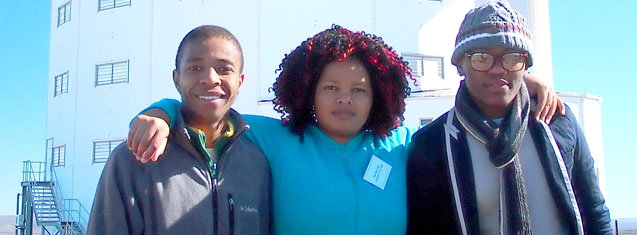Latest News Archive
Please select Category, Year, and then Month to display items
28 June 2022
|
Story Nonsindiso Qwabe
|
Photo ALBERT VAN BILJON
 In conversation: Prof Petersen and Leanne Manas.
In conversation: Prof Petersen and Leanne Manas.
An outward-looking, globally competitive university that ranks among the top-tier universities in South Africa and on the continent, driven by a strong human-centred, diverse social-justice approach. This is at the heart of the vision
Prof Francis Petersen, Rector and Vice-Chancellor of the UFS, shared with multi-award-winning
news anchor
Leanne Manas during a sit-down conversation on Friday 22 July 2022.
Prof Petersen reflected on the great strides and difficulties faced during his first term, as well as navigating the UFS through the COVID-19 pandemic to position the institution in a strategic and focused manner as a university of choice on the continent
and in other parts of the globe.
 Prof Prakash Naidoo, Vice-Rector: Operations, introduced Leanne Manas
Prof Prakash Naidoo, Vice-Rector: Operations, introduced Leanne Manas
 Prof Francis Petersen
Prof Francis Petersen
 Leanne Manas and Prof Petersen In conversation
Leanne Manas and Prof Petersen In conversation
 Leanne Manas
Leanne Manas
 Leanne Manas meeting our staff members.
Leanne Manas meeting our staff members.
 Leanne Manas meeting our staff members.
Leanne Manas meeting our staff members.
 Leanne Manas meeting our staff members.
Leanne Manas meeting our staff members.
 Prof Petersen with some of our staff members
Prof Petersen with some of our staff members
 From the left; Prof Prakash Naidoo, Leanne Manas, Prof Francis Petersen and Temba Hlasho, Executive Director: Student Affairs
From the left; Prof Prakash Naidoo, Leanne Manas, Prof Francis Petersen and Temba Hlasho, Executive Director: Student Affairs
 Leanne Manas meeting our staff members.
Leanne Manas meeting our staff members.
 From the left; Prof Prakash Naidoo, Prof Francis Petersen and Quinton Koetaan, Senior Director; HRA
From the left; Prof Prakash Naidoo, Prof Francis Petersen and Quinton Koetaan, Senior Director; HRA
 Leanne Manas meeting our staff members.
Leanne Manas meeting our staff members.
Students attend prestigious National Astrophysics and Space Science Programme
2014-08-22

From the left are: Thokozane Ngcongwane with Mbali Xaba and Thabo Kumalo (both third-year Physics and Chemistry students).
Three students from our Qwaqwa Campus – Thokozane Ngcongwane, Mbali Xaba and Thabo Kumalo – were recently selected to attend the prestigious National Astrophysics and Space Science Programme (NASSP). The programme – in partnership with the National Research Foundation (NRF) – ran for two weeks at the South African Astronomical Observatory (SAAO) in Cape Town.
The project targets students from formerly disadvantaged institutions of higher learning, where astronomy and astrophysics are not offered.
Students are invited to apply for the programme, with emphasis placed on students majoring in mathematics and physics. Students from other fields are also invited to apply, though. The programme allows for the development of black astronomers and astrophysicists, which are in demand in the ever-growing environment of astronomy in South Africa.
“Topics such as gravitational lenses, black holes, stellar evolution and the mysteries of cosmology were presented and students were invited to engage with the speakers during and after the presentations,” said Ngcongwane, a third-year Zoology and Entomology student.
The programme challenged them to work on basic astrophysical concepts in groups while individual written assignments were part of the learning process as well.
“Given the lack of information about the complexities of astronomy the students had, this was the most ideal time to learn about all matters astronomy and astrophysics as lectures offered a lot to young and excited minds,” Ngcongwane said.